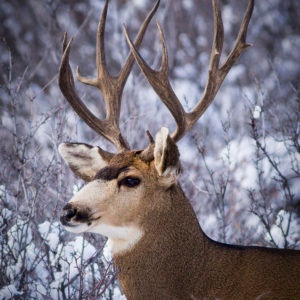 Imagine, for a moment, that you’re a Paleolithic human. You’re standing at the top of a hill overlooking a herd of deer lazily grazing on the yellowing grasses and shrubs in the open plains below you. A gust of wind blows at your face, causing you to squint and tears to well up in your eyes. But this is good; the herd will have a harder time catching your scent. A low, drawn out rumble in your stomach interrupts your thoughts. You had managed to find a handful of berries early that morning, but the days are getting shorter and the nights colder, and you know that such food won’t be available for much longer. Your grip tightens around a stone-tipped spear, and you crouch to begin your slow approach towards the herd, the taste of cooking venison already on your tongue.
Imagine, for a moment, that you’re a Paleolithic human. You’re standing at the top of a hill overlooking a herd of deer lazily grazing on the yellowing grasses and shrubs in the open plains below you. A gust of wind blows at your face, causing you to squint and tears to well up in your eyes. But this is good; the herd will have a harder time catching your scent. A low, drawn out rumble in your stomach interrupts your thoughts. You had managed to find a handful of berries early that morning, but the days are getting shorter and the nights colder, and you know that such food won’t be available for much longer. Your grip tightens around a stone-tipped spear, and you crouch to begin your slow approach towards the herd, the taste of cooking venison already on your tongue.
For most of us living in 2016, the above scenario isn’t very relatable. Our domestication of animals and expansive food system has made it possible for us to easily access the food we need to survive; no spears, bows, or arrows necessary. But even with our grocery stores and farmers’ markets, millions of people across the country take to the outdoors to hunt game. So that raises the question: if we don’t need to hunt for our survival anymore, then why do it?
It can be argued that hunting is an ethical reaction to past human activity, namely our impact on predator populations in ecosystems. In a natural system, predators play the enormously important role of balancing populations of their prey. For instance, in the Eagle River Valley, mountain lions prey on animals like deer, which get most of their energy from grasses and shrubs. If mountain lions were to disappear from the area, then the deer population would rise and more deer would be competing for the same amount food, forcing the hungry deer to overeat and kill the grasses and plants whose roots help prevent erosion. Eventually, large numbers of deer would die from starvation, and fewer root systems in the soil could lead to serious erosion issues and habitat degradation. Not exactly a situation we want for our natural areas! Unfortunately, in many areas the establishment of larger human settlements has led to predatory animals like mountain lions, wolves, and grizzly bears either being reduced or completely driven out. So by hunting, we take up the ecosystem responsibilities that these predators once held, and therefore help keep ecological balances in place.
Why not just bring predatory animals back into these areas so we don’t have to hunt and the system can naturally manage itself? In some situations, such as the reintroduction of wolves into Yellowstone, this strategy has been proven to be effective. Unfortunately, in areas with higher human and livestock populations, bringing back highly predatory animals poses risks to humans that most people are not willing to take.
With all of this in mind, it’s important to realize that modern hunting is much more complex than buying a gun, walking into the woods and waiting for something to shoot. State Departments of Fish and Wildlife closely monitor game animal herds and use the data to calculate how many of each species can be safely taken without harming the total population. Also, the fees associated with hunting and fishing are the primary source of funding for state based conservation programs, totaling almost $200 million each year nationwide to help conserve land and educate the public about sustainable hunting practices.
So this year, as millions of people take to the land looking for that prize buck, bull, or billy, remember that through hunting we can help balance our ecosystems, feel connected to the land, and bridge the gap between us and our most distant ancestors, as long as it’s done thoughtfully and with care for the environment that we cherish.
Teddy Jones is a Naturalist with Walking Mountains Science Center. While he doesn’t personally hunt animals, he does like hunting for deals at thrift stores.









